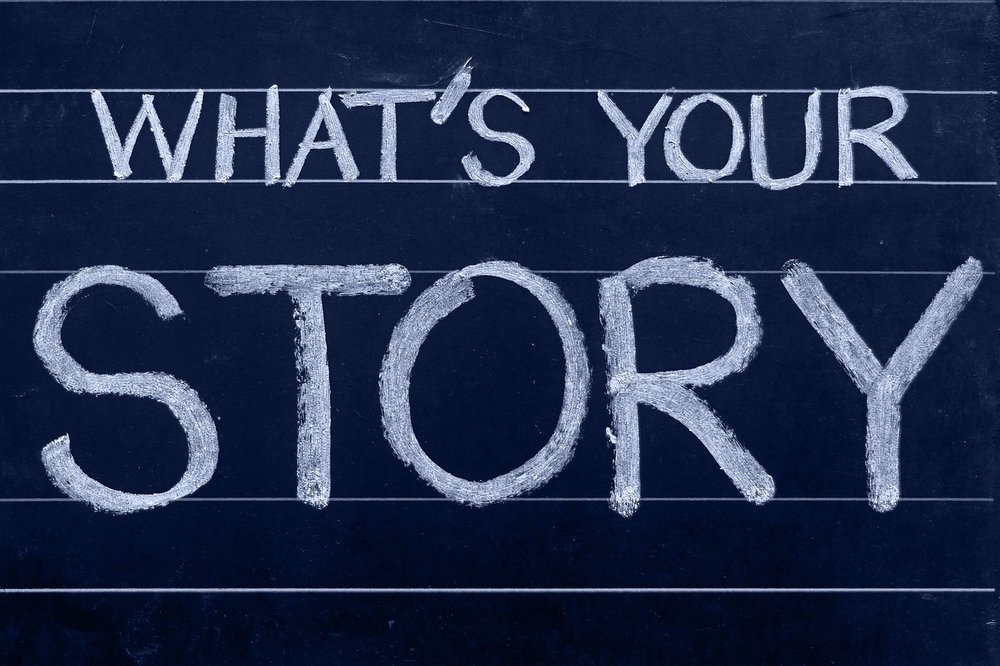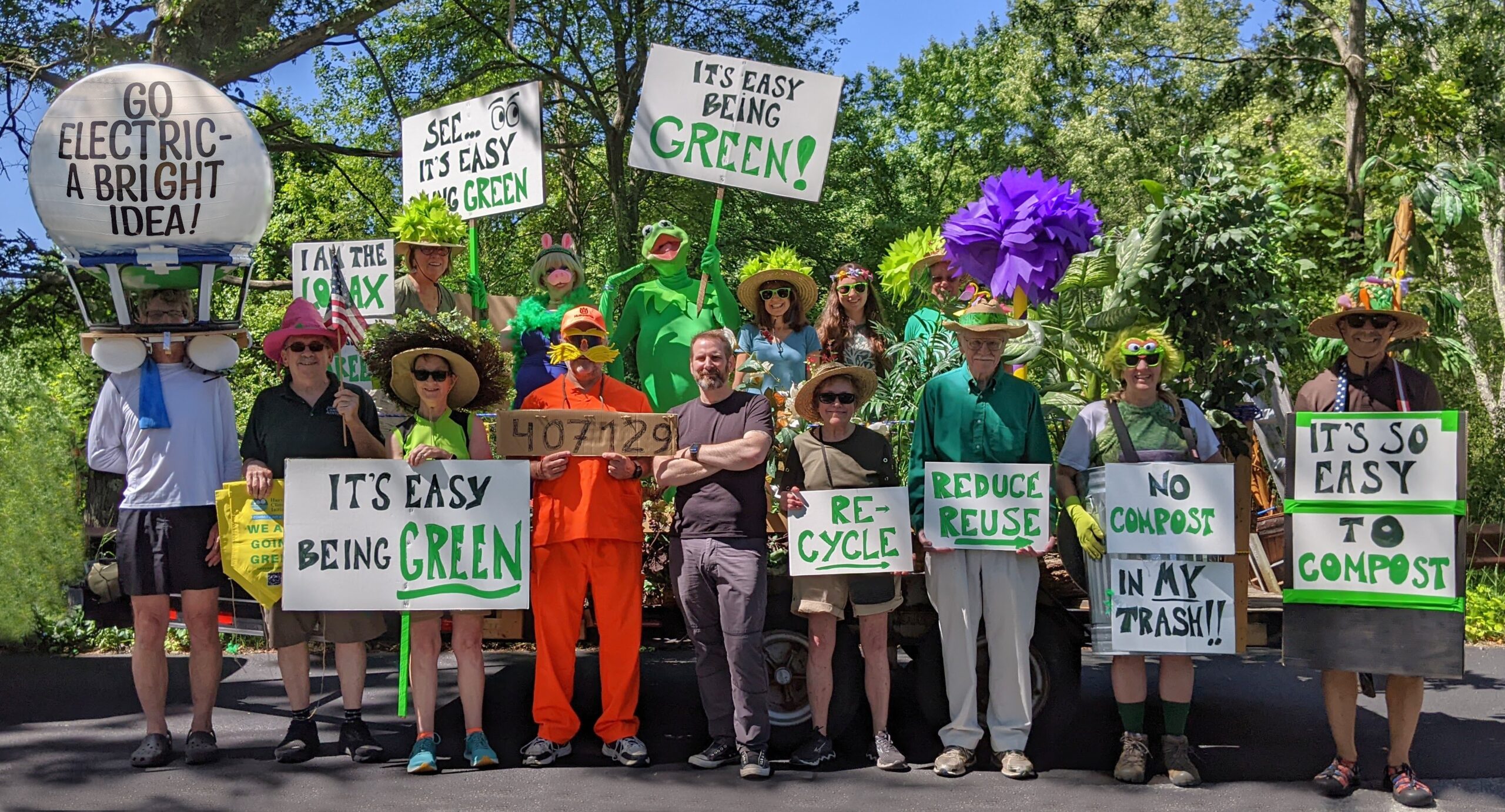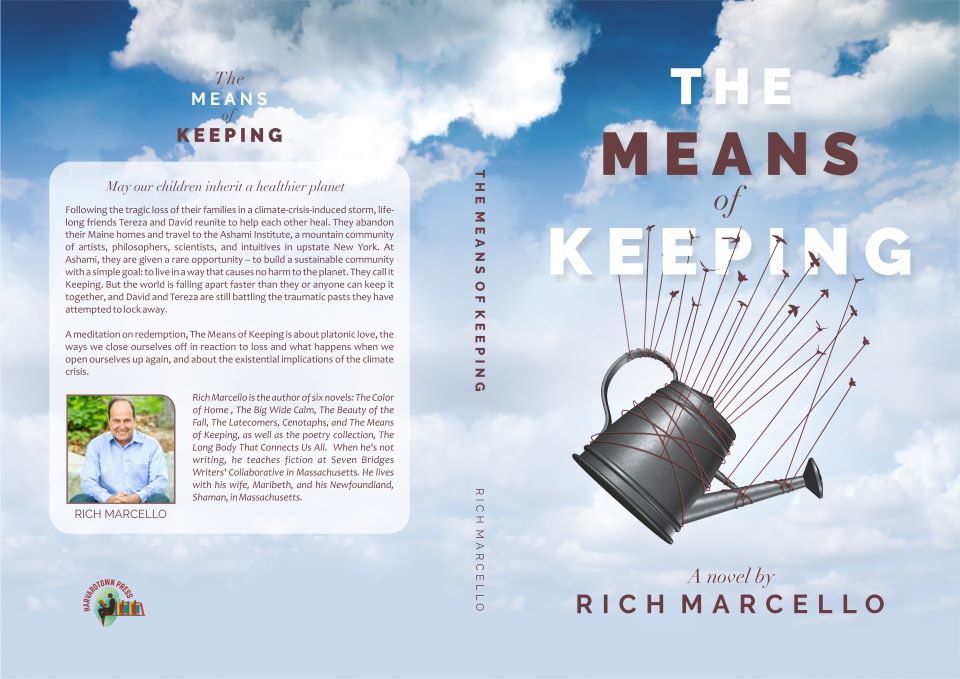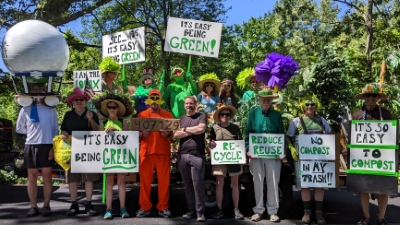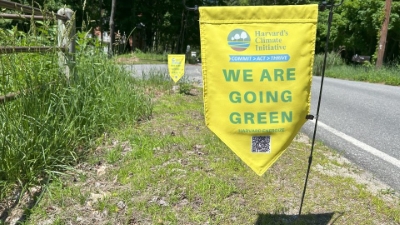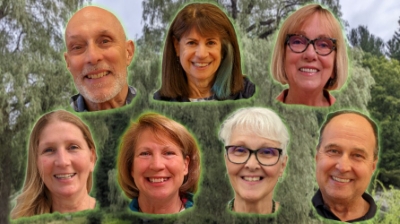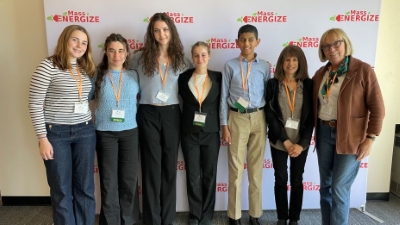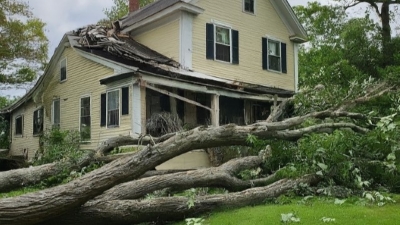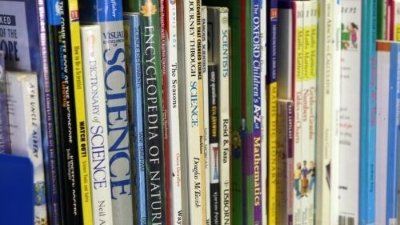HC2: Harvard Community Conferences – Climate Stories
Co-sponsored by Arm in Arm and Harvard’s Climate Initiative CommitteeWas on
Saturday, March 2, 2024
We were delighted to co-sponsor this year’s Harvard Community Conference (HC2). The first HC2 event was held 7 years ago. A Bromfield student approached Harvard’s inclusive community group, Arm in Arm, with her idea to start a yearly student-led event to explore the theme of embracing human diversity through stories, shared with community. The theme of the first conference was “Identity”.
This year’s student conference focused on stories and observations of climate change as seen through the eyes of local residents. These stories touched upon personal experience, thoughts, and reflections about climate change. Student organizer Michele Buni, a Bromfield student, gathered a great line-up of speakers and recorded interviews of local residents ranging in age from 11 to 95, which included:
Melissa Marteney (Harvard Resident): Melissa worked for 21 years at the Department of Conservation and Recreation (DCR) where she observed the effects of climate change in many different aspects of recreational activities, conservation efforts and beach operations.
Ellie Maglothlin: Ellie is a Bromfield graduate and activist.
Adam Meier (Harvard Resident): Adam is a Green, Healthy, and Sustainable Products Director at Housing Partnership Network. He works across a network of leading affordable housing nonprofits to build and support healthy, vibrant, and sustainable communities for all.
Marion Stoddart (Ayer Resident): Marion is a renowned local activist and community leader best known for her work leading up to the rescue and recovery of the Nashua River in Massachusetts and New Hampshire. She later founded the Nashua River Watershed Association.
Charlotte Vallaeys (Harvard Resident): Charlotte is an expert in all things organic at General Mills, one of the largest producers of certified packaged foods with brands including Annie’s, Cascadian Farm and Muir Glen.
Paul Willard (Still River Resident): Paul is a well-known member of our community. Paul ran the Willard Farm and provided vegetable plants and summertime produce in Still River for the last several decades. He is especially known for his superior corn. Paul also served on the Town Conservation Commission and as Harvard’s Animal Control Officer.
Stories of personal commitment and ideas for action at climate conference
From the Harvard Press by CARLENE PHILLIPS · FRIDAY, MARCH 15, 2024
The seventh annual Community Conference (HC2), with a focus on stories of climate change, was held in Volunteers Hall Saturday afternoon, March 2, and was filled to capacity. It was sponsored by Arm in Arm and the Climate Initiative Committee, and several town land-use organizations and the Board of Health had representatives and handouts.
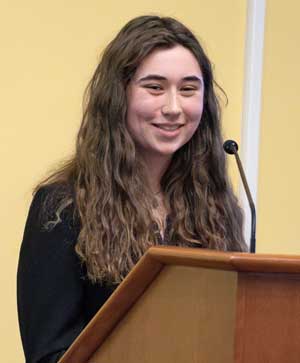
Michele Buni, the annual Harvard Community Conference organizer, greets the crowd and introduces the topics that will be covered in the conference. (Photo by Lisa Aciukewicz)
Student organizer Michele Buni, a Bromfield junior, set a tone of excitement and positivity for the afternoon. She was eager to share the fact that the speakers, ranging in age from 10 years to 95, represented a variety of experiences and perspectives. She said she hoped their concerns and ideas about how to confront climate change within and beyond our own community would spark questions, conversations, and actions.
The first speaker was Melissa Marteney who, realizing her passion lay in working outdoors, joined the Department of Conservation and Recreation, State Parks division. Much of her 21 years was as a beach manager, responsible for 12 inland and coastal beaches and 10 urban pools in the northeast corner of the state. During that time she witnessed the effects of climate change, most dramatically on the coastal beaches north of Boston.
She observed how rising sea level has caused coastal erosion, an increase in dangerous riptides, and the loss of ecosystems. More frequent flooding has washed sand over the roads. Rising temperatures have made the ocean hospitable to an offensive-smelling brown algae, and inland beaches have seen increases in bacteria. In wooded areas, warmer temperatures mean fewer ticks and invasive beetles are dying out in winter, and more severe storms and microbursts cause extensive tree loss. These problems have necessitated increased spending and also more frequent beach closures, which have a negative impact on the mental health of both visitors and employees. Looking for a positive in all this, Marteney said that the Legislature is being responsive, budgeting money for remediation and putting more funding into resilience action.
Younger generation’s concerns
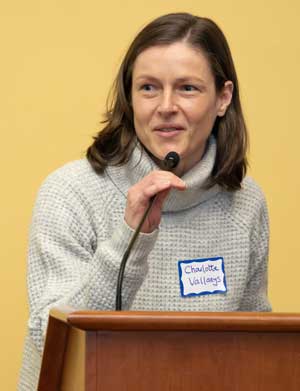
Charlotte Vallaeys tells about her version of cultural shock moving from Belgium to the United States at age 12: Food. She is now an expert in all things organic at General Mills, one of the largest producers of certified organic packaged foods. (Photo by Lisa Aciukewicz)
Three Hildreth Elementary School fifth-graders presented their concerns about the effects of climate change. Claire Battaglia said she is worried about the animals, particularly bees, which are so important. She said that though mostly the older generation is blamed for climate change, younger generations have a responsibility, too. Anna Frantzdale’s focus was on how the ice caps are getting smaller because of greenhouse gas emissions. She fears polar bears may become extinct. The health of the ocean is Holly Cavicchi’s chief concern. She explained that because the ocean absorbs carbon, we need to help the ocean to help the climate. Summing it up, the students warned that with melting ice caps and rising sea level, Boston is under threat.
Adam Meier spoke about his personal journey to build sustainable communities. Meier’s first point was that we need to take a holistic approach to what affects ecosystems and to see addressing climate change as an endurance event, not a sprint. In 2008, he was an activist pushing President Obama for climate action. Sixteen years later, results finally came with the provision for national climate action in the Inflation Reduction Act. He said the work is collective—“Every profession should apply a climate eye,” and health care especially needs to address the “upstream” effects of climate. He sees tradespeople as the essential workforce for the green jobs that are needed and said we need more “respect for the fellows with wrenches in their hands.” We have to take responsibility for including marginalized communities in the transition, he said; “Sustainable ecosystems have to be for all.” In closing, Meier encouraged the audience to simultaneously fear change and embrace it and advised, “Follow your passion, fail often, and remember, this a collective challenge.”
Charlotte Vallaeys described how her early awareness of the planet as one interconnected organism and her “food shock” in moving from Belgium to the United States when she was 12 merged as she pursued an education and then a career in working to “feed the world without destroying it.” She is now the organic expert at General Mills, one of the largest producers of certified organic foods.
Vallaeys talked about how agriculture contributes emissions that cause climate change and what we can do to minimize them. She said some problems are an abundance of cattle that release methane and the use of fertilizers with nitrous oxide, which leave a large carbon footprint. For 14,000 years, agriculture practices worked; now with hotter temperatures, fires, and floods, agricultural systems have to change with climate change. To help with these changes, people can make plant-based food the center of their diet and buy food labeled USDA organic. The label means much more than a lack of pest-icides; it means the food has been grown according to rules enforced by the government, including farming that recycles nitrogen. “Organic is so much of the solution,” said Vallaeys.
Climate change and human rights
Echoing some of Meier’s concerns, Bromfield senior Ellie Maglothin focused on the intersection of human rights and climate change. She expressed her convictions that powerful people and large corporations are fueling climate change; underage children are laboring to sustain our need for growth; and people are exploited for profit.
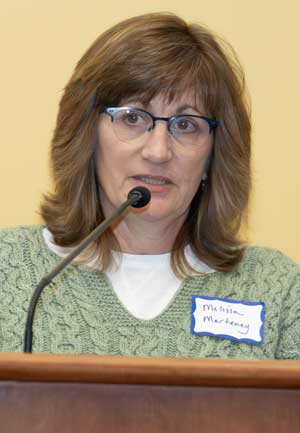
Melissa Marteney. (Photo by Lisa Aciukewicz)
She said our society is driven by consumerism; people want more, more, more and discard perfectly good things, heedless of the problem of mounting trash. All these things are violations of human rights, she said. There are millions of people who can’t ignore the effects of climate change on their lives. And, she said, “While we are privileged now, our privilege won’t last forever.” We can change things “if every person lowers consumption and puts pressure on corporations.”
The last two speakers, Marion Stoddart and Paul Willard, had been recorded by Buni, and she played excerpts. Stoddart had also come in person.
Stoddart, who lives in Ayer, described how severe drought in the 1960s made the Nashua River more polluted than ever; in fact, it was one of the 10 most polluted rivers in the country. At this same time, the League of Women Voters was studying water legislation. Motivated by her concern about the Nashua River and armed with her knowledge of state policies, Stoddart, working with leaders in surrounding towns, organized a citizen group to clean up the river.
You never know where help might come from, said Stoddart. The commanding officer at Fort Devens was invested in the cleanup of the river, 8.2 miles of which runs through Devens. He gave Stoddart the use of a building and provided a staff of engineers and planners. A member of the U.S. Fish and Wildlife Service contacted Stoddart to say if she could put a project together, he had some funding. She assembled a group of underprivileged high school students for project Clean Up Our Riverbanks, working with town conservation committees.
A farmer’s view
Paul Willard described the start of the family farm in Still River. His grandfather put some buckets of flowers out for sale—goldenrod and bittersweet. People bought them, and that planted the idea of growing and selling vegetables. Paul had been living elsewhere but moved back to help with the farm.
He said he knows about climate from being a farmer. Fifteen or 20 years ago, you didn’t see such extreme weather shifts for so long. He said he is hopeful that people will learn how to “do things differently within what money allows.” But he emphasized that rather than tell people what they can’t do, suggest what they can do.
Buni thanked everyone for coming and expressed gratitude to co-organizer Ellen Sachs Leicher. She ended the conference with these words from Marion Stoddart: “I would like for everyone to know that they make a difference, and that they can be an element of change. What we need to do is to create a vision of what it is we would like to have in this Earth, and then commit to it.”
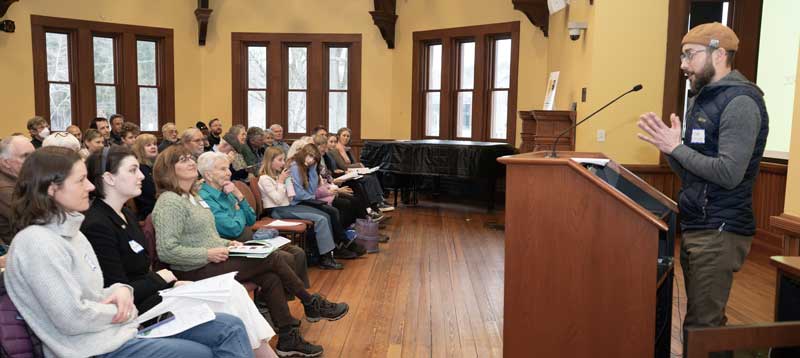
Adam Meier speaks to a full house at the annual Harvard Community Conference held in Volunteers Hall at the library Saturday, March 2. (Photo by Lisa Aciukewicz)

